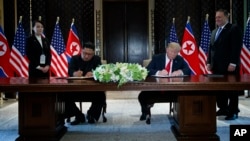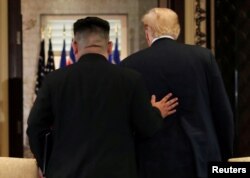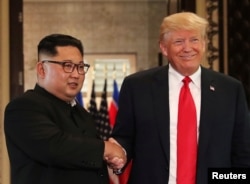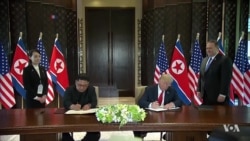President Donald Trump and North Korean leader Kim Jong Un made history with their summit meeting in Singapore. But beyond the handshakes, casual strolls and shared asides, many analysts and experts are already wondering what exactly the enduring substance of the summit will be and whether it could boost Trump's political rating at home.
For Trump, the great political disrupter, it was the most significant foreign policy move of his presidency. It comes at a time when he looks to turn around his often weak polls and bolster his political standing at home in advance of midterm congressional elections in November, where Democrats are poised to make gains.
Enduring images
From the images of their historic first handshake to signing an agreement on denuclearization, Trump and Kim took the first steps toward writing a new chapter in relations between their two countries.
"People are going to be very impressed, people are going to be very happy, and we are going to take care of a very big and very dangerous problem for the world," Trump said sitting alongside Kim after both men signed the joint agreement.
Seizing the moment
It was Trump's biggest moment on the world stage, and an opportunity he was eager to seize.
"We got along really well.We had a great chemistry.You understand how I feel about chemistry.It is very important," Trump told VOA contributor Greta Van Susteren immediately after the summit. "I mean, I know people where there is no chemistry. We had it right from the beginning. We talked about that and I think great things are going to happen for North Korea."
It was the first ever meeting between a U.S. president and a North Korean leader. The two men signed an agreement that committed both countries to work toward the denuclearization of the Korean peninsula, but the details remain vague.
The United States offered unspecified security guarantees and a halt to military exercises with South Korea. Trump also said he raised the issue of human rights with Kim, but added that most of the meeting focused on the nuclear issue.
Trump took a victory lap of sorts during a post-summit news conference. "We're prepared to start a new history and we're ready to write a new chapter between our nations."
The president was also eager to cast himself as peacemaker. "I'll do whatever it takes to make the world a safer place," he said.
Style versus substance
To a number of analysts, it was a summit heavy on symbolism, but light on substance.
"For both sides, this was really just a matter of meet and greet' and getting to know each other, and sort of paving the way for them to hold future talks," said Kyle Ferrier with the Korea Economic Institute of America.
The summit with North Korea followed a divisive G-7 summit in Canada, where Trump and Canadian Prime Minister Justin Trudeau crossed swords over trade and tariffs, and Trudeau vowed retaliation."Because as Canadians, we are polite, we're reasonable, but we also will not be pushed around," Trudeau told reporters.
Trump's at times aggressive and unpredictable actions on the world stage have their roots in the campaign promises he made to his supporters, according to Ferrier.
"I think a lot of what Trump is doing in foreign policy is being very disruptive, and that is part of what he ran on.He doesn't like the status quo and a lot of this will appeal to Trump's base."
WATCH: US N. Korea meeting
Trump likely expects the North Korean summit will give him political momentum at home, and his historically-low poll numbers have improved of late.
"So what we are talking about with Donald Trump is that his [poll numbers] are just edging up," said Gallup pollster Frank Newport. "His poll approval average has been about 39 or 40 percent for a long time. But in recent weeks in our Gallup polling, it has edged up to 42 percent, and actually we had one week recently where it was 43 percent."
Trump is expected to tout the summit as a major political achievement.
But it remains unclear how much that might help Republicans as they face a difficult congressional midterm election in November.
"The president is always the central person on the ballot in the midterms," said John Fortier of the Bipartisan Policy Center in Washington. "Even though he is not technically on the ballot, he is the person that the out-party votes against, and we do have very strong opposition to Donald Trump on the Democratic side and that is coming out in the enthusiasm and in the turnout that we see."
It will now be up to Trump to frame his North Korea outreach as a political success, even if questions remain about the substance of what was actually achieved in Singapore.






























